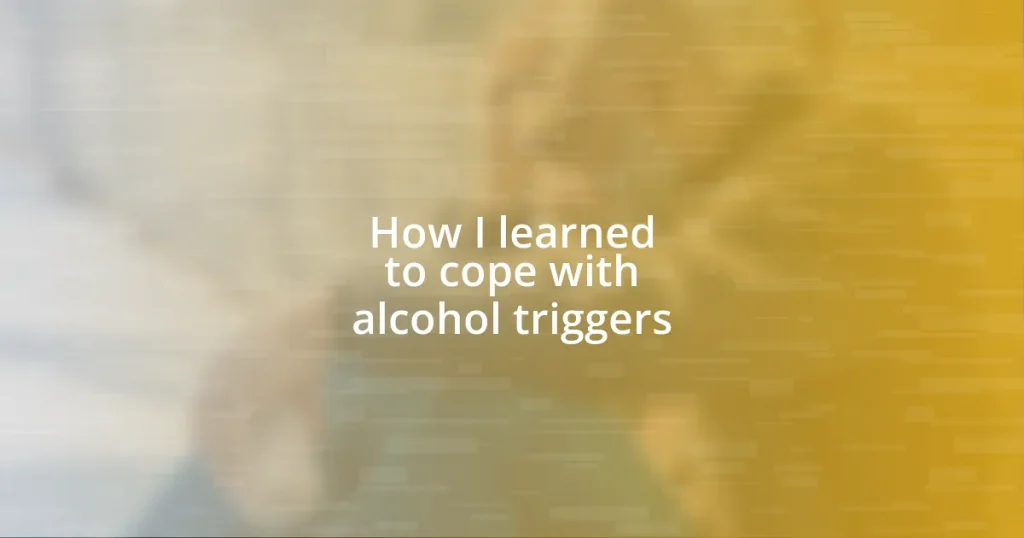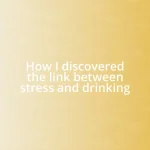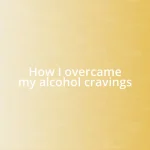Key takeaways:
- Recognizing and understanding personal triggers, including emotional, social, and situational, is crucial for managing alcohol cravings effectively.
- Implementing coping strategies such as mindfulness, developing a support network, and setting boundaries can significantly improve resilience against triggers.
- Creating a long-term plan with structured coping strategies and regular self-assessments helps in identifying and addressing cravings over time.
- Celebrating progress and milestones fosters motivation and reinforces commitment to sobriety, acknowledging both big achievements and small victories.
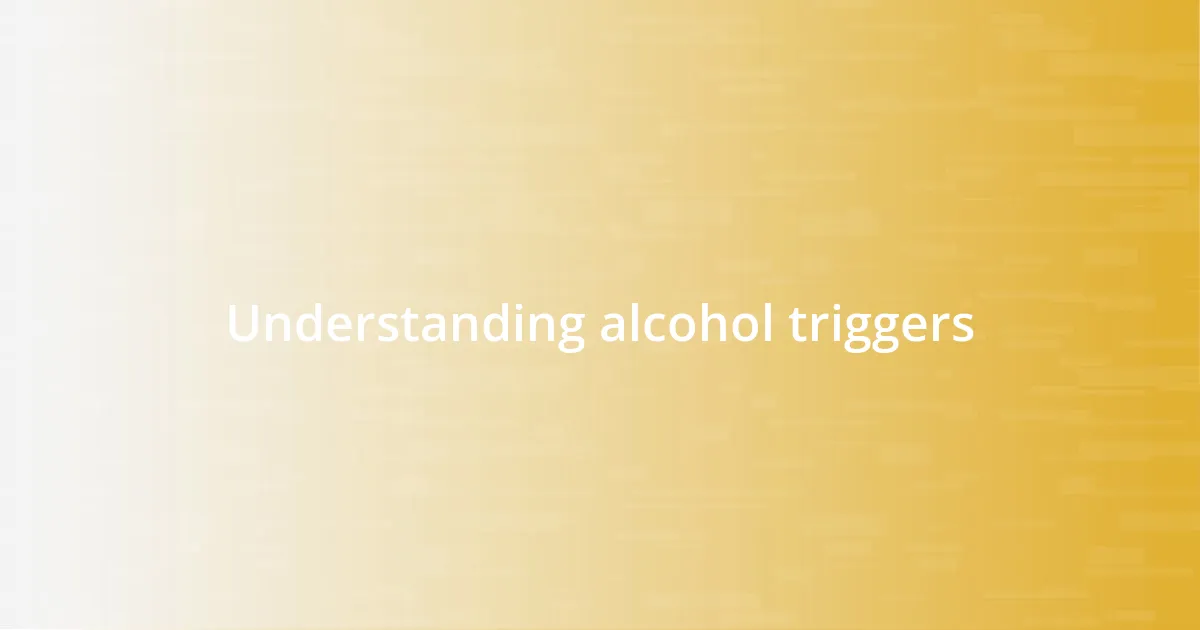
Understanding alcohol triggers
Understanding alcohol triggers is essential to managing cravings effectively. I remember a time when I walked into a bar for a friend’s birthday party, and the sight of those vibrant cocktails was overwhelming. It hit me—did I really want to be there, surrounded by my old habits, or was this just a nostalgic pull dragging me back to a familiar, yet dangerous, comfort?
Triggers can be anything from social settings to emotional stresses and even certain times of the year. I recall feeling particularly vulnerable during the holidays when festive gatherings seemed incomplete without alcohol. It made me question, why do we associate joy and celebration so strongly with drinking? Recognizing these patterns was a turning point for me, as it sparked the realization that my happiness shouldn’t hinge on a drink.
When I started paying closer attention to my triggers, I felt a surprising sense of empowerment. It was like shining a light on the shadows of my past. I realized that avoiding triggers wasn’t just about staying away from bars or parties—it was also about confronting the emotions tied to those situations. Have you thought about what specific situations make you reach for a drink? Understanding that connection is crucial in breaking the cycle.
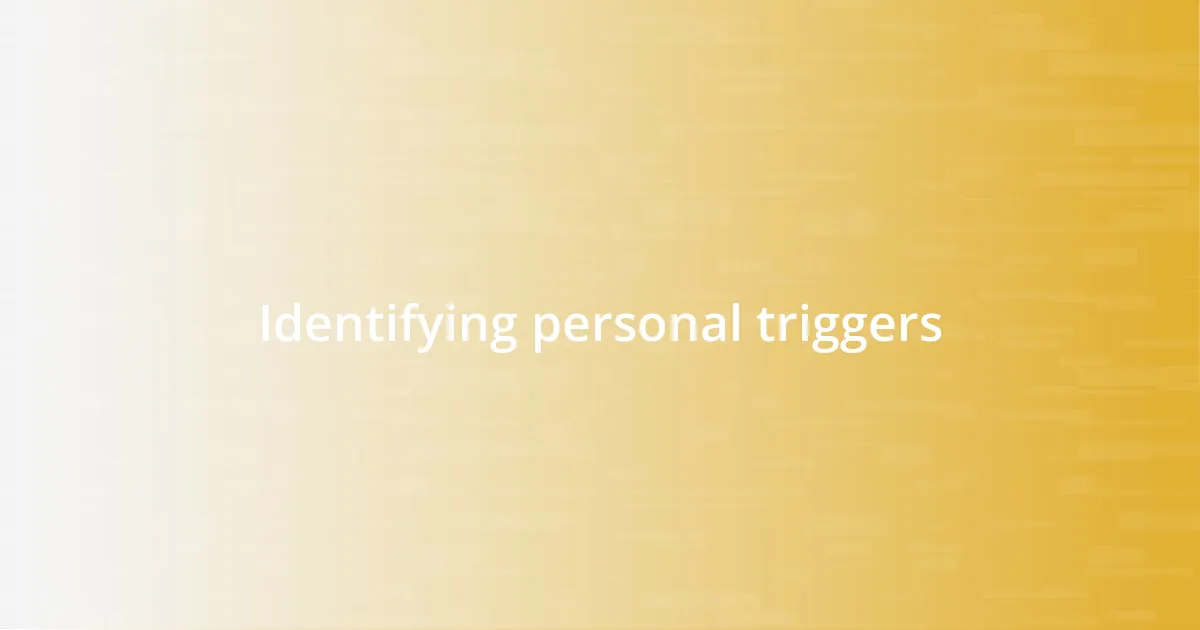
Identifying personal triggers
Recognizing personal triggers is a deeply personal journey. For me, it wasn’t only about avoiding places where alcohol is present but understanding the emotions behind my cravings. I vividly remember a particular evening, feeling lonely after a tough workday, when the urge to pour myself a drink felt like an automatic response. Reflecting on that moment taught me to look deeper; what was I really craving? Comfort? Connection? Identifying these emotional triggers was a game changer.
It’s also interesting how certain people can trigger cravings without intent. Just being around my old group of friends brought back memories of carefree nights filled with laughter and drinks. I found myself at a crossroads, feeling the weight of nostalgia, reminding me of both good times and the repercussions that followed. I learned to consciously assess my feelings in these situations, allowing me to reclaim my power and make intentional choices rather than react instinctively.
In examining my routines, I discovered specific times when the cravings would hit hardest, like Friday evenings. That shift from the workweek to the weekend used to signal “time to unwind” with a drink. I decided to replace that thought pattern with healthier alternatives, such as going for a jog or enjoying a movie night at home. By acknowledging these timing triggers and proactively replacing them with positive activities, I felt a significant shift in my mindset.
| Type of Trigger | Personal Experience |
|---|---|
| Emotional Triggers | Feeling lonely after a tough workday led to cravings. |
| Social Triggers | Nostalgia around old friends reignited past habits. |
| Situational Triggers | Friday evenings used to mean unwinding with a drink. |
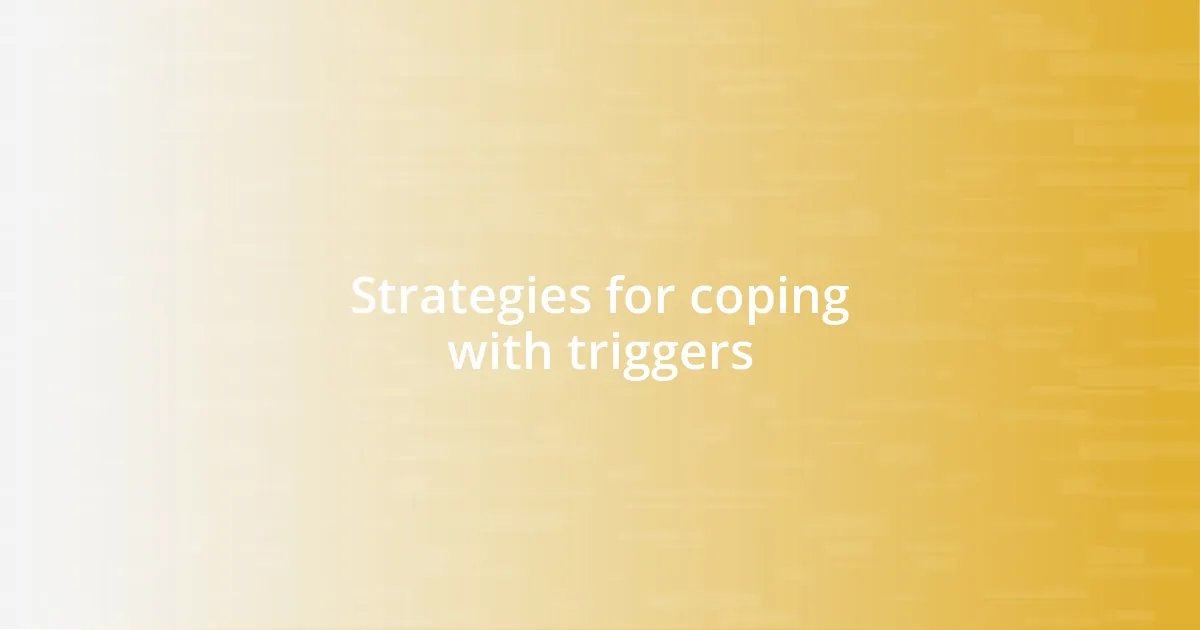
Strategies for coping with triggers
When coping with triggers, it’s vital to have a toolbox of strategies at your disposal. I remember one evening, instead of reaching for a drink, I opted for a soothing cup of herbal tea while reminiscing about my day. That small switch became pivotal. It’s essential to have alternatives that redirect your focus and help ground you in those challenging moments.
Here are some effective strategies I found helpful:
– Develop a Support Network: Surround yourself with friends who understand your journey and can offer encouragement.
– Practice Mindfulness: Engaging in mindfulness exercises or even deep breathing can enhance awareness of your cravings and help you pause before reacting.
– Set Clear Boundaries: It’s okay to say no to social events that might be too tempting or overwhelming.
– Engage in Healthy Hobbies: Find activities that bring you joy, such as painting or hiking, which can divert your mind from cravings.
– Create a Mantra: Whenever cravings arise, repeating a positive affirmation can reinforce your commitment to sobriety.
Each of these strategies helped me address triggers in the moment, contributing to a more resilient mindset. One example that stood out was when I started journaling my thoughts during moments of temptation. This practice not only cleared my head but also provided insights into my emotional responses, helping me understand that each craving stemmed from something deeper than just a desire for a drink. Reflecting in this way made my coping mechanisms not merely reactive but more proactively rooted in self-awareness.
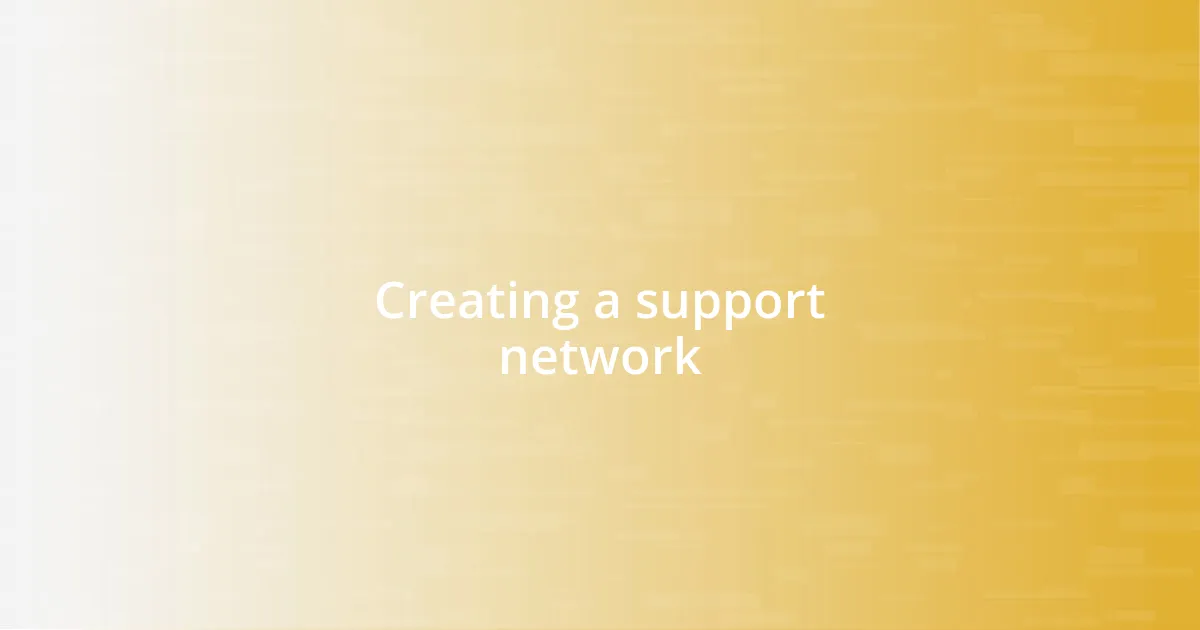
Creating a support network
Building a support network is one of the most significant steps I took in my journey. It started with a close friend I confided in about my struggles. Simply having someone who understood my challenges made those seemingly insurmountable cravings feel less daunting. I often wonder: how much stronger could we be together rather than alone?
I quickly realized that not all relationships are conducive to recovery. I made a conscious effort to surround myself with positive influences—friends who celebrated my milestones and empathized during tough times. One memorable evening, when an unexpected craving hit me hard, I reached out to my support group instead of succumbing to old habits. Their encouraging messages offered immediate reassurance, reminding me that I was not fighting this battle alone.
Utilizing online platforms was another game changer for me. I discovered communities where individuals openly shared their journeys. Reading their stories was like looking into a mirror; I felt connected and understood. Engaging in these discussions almost felt therapeutic, as I knew that together we could celebrate our victories and navigate our triggers. Have you considered how sharing your experiences can lighten your burden? I’ve found that openness creates a bond—turning isolated moments of struggle into shared experiences.
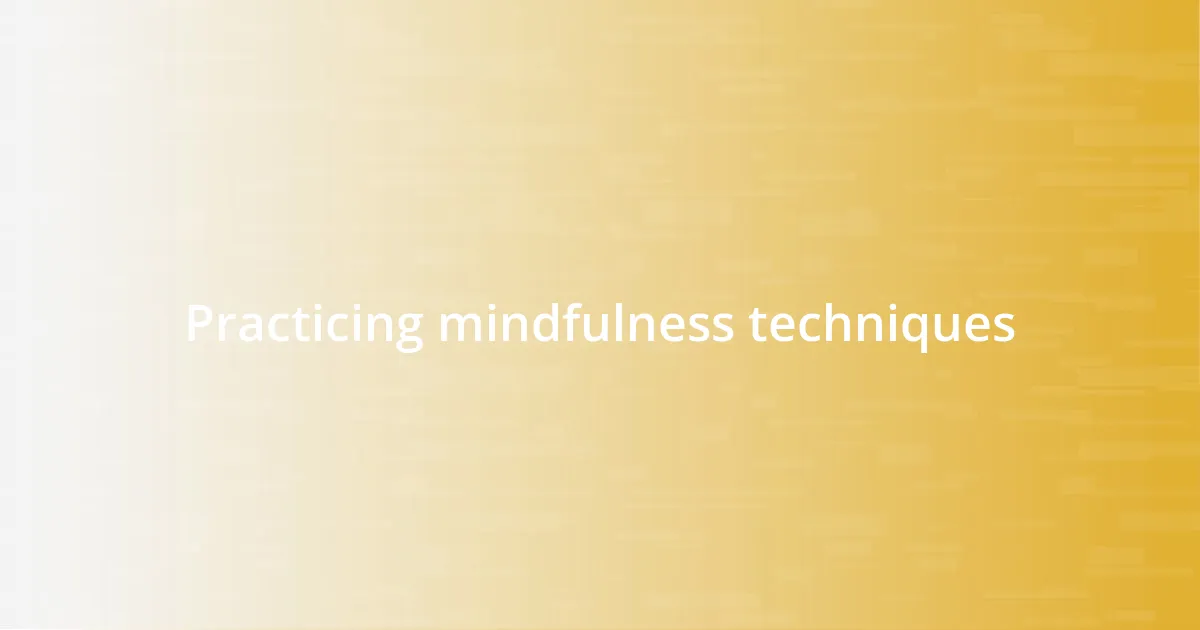
Practicing mindfulness techniques
Practicing mindfulness has been transformative in my journey to cope with alcohol triggers. One particular evening, when I was faced with a strong craving, I sat in a quiet room, closed my eyes, and focused on my breathing. In those moments, I recognized that the discomfort of my craving was just a passing thought, not a directive I had to follow. It was a revelation; realizing that I could observe my feelings without acting on them gave me enormous strength.
I also found that incorporating mindfulness into my daily routine helped me cultivate a proactive mindset. During moments of stress, I began to set aside time for short meditation sessions, often just ten minutes. The practice feels like a reset button for my mind, bringing peace to chaotic moments. Have you tried just pausing and checking in with yourself during a craving? I often used this technique to create space between impulse and action, reminding myself that I could choose how to respond.
Another effective mindfulness technique I embraced was mindful observation. I started to take walks in nature, focusing on the sights, sounds, and smells around me. The experience was almost meditative, pulling me away from the internal dialogue that often led to cravings. It’s ironic how something as simple as noticing a bird singing or the rustle of leaves can restore clarity. In those moments, I often think, isn’t life richer when we take the time to truly be present? This practice helped me not only cope with triggers but also appreciate the beauty of life outside of my cravings.
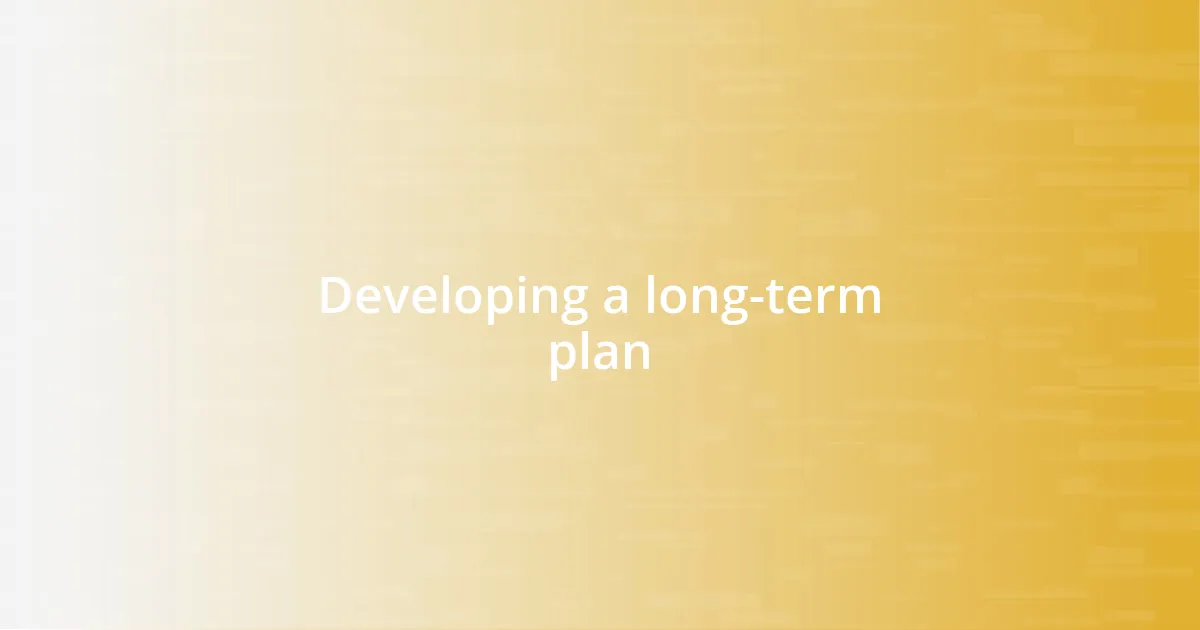
Developing a long-term plan
When I first considered the long-term plan for managing my triggers, I was overwhelmed by the complexities. I started by creating a structured schedule that included coping strategies for days I knew would be particularly challenging. For instance, I designated Fridays as “self-care nights,” leaving them free for activities like reading or cooking rather than socializing, which often posed a risk. Have you ever thought about how a little planning can reshape your experience?
I also learned the importance of setting realistic, measurable goals. One of my objectives was to assess my cravings weekly and note what triggered them. This practice helped me recognize patterns and informed my decision-making in social situations. During one particular week, I discovered that stress from work was a major contributor. It was eye-opening—recognizing that simple changes in my environment could lead to significant shifts in my cravings.
Moreover, I incorporated regular check-ins with myself to evaluate my progress. These check-ins became a personal ritual, where I would reflect on what worked, what didn’t, and why. The honest conversations with myself were revealing. One day, as I sat with my journal, I asked myself: “What am I truly avoiding by reverting to old habits?” This question propelled my growth and made me realize that confronting discomfort was essential to my journey. There’s something powerful about acknowledging our vulnerabilities; it’s where real healing begins.
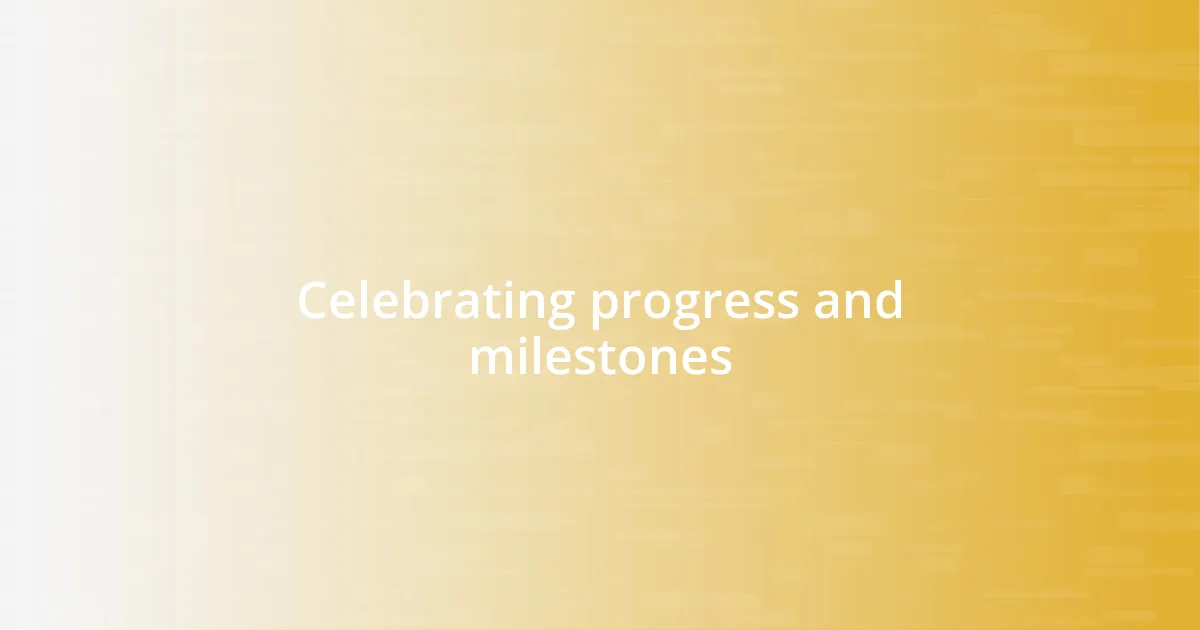
Celebrating progress and milestones
Celebrating progress is often the spark that keeps me motivated on this journey. Recently, I reached a significant milestone—two months without giving in to my triggers. I remember treating myself to my favorite dessert, feeling as if I was not just rewarding a habit but celebrating my entire journey. That moment was a reminder: each step forward, no matter how small, deserves recognition.
Milestones can feel personal, almost sacred. I started jotting down moments of achievement in a journal, and flipping through those pages feels like a walk down memory lane. One entry stands out; it was after I successfully navigated a social event without feeling the urge to drink. I wrote, “Today, I learned that my strength isn’t just in avoidance; it’s in making fulfilling connections without alcohol.” It’s amazing how those reflections can solidify my resolve and bolster my self-esteem.
I often ask myself, what does celebrating progress really mean? For me, it’s about taking stock of my journey and embracing the joy of self-growth. When I find time to acknowledge not just the big wins but also the little victories—like saying no to that first drink at a party—I experience a profound sense of empowerment. It’s these milestones, big and small, that fuel my commitment and keep me moving forward.










